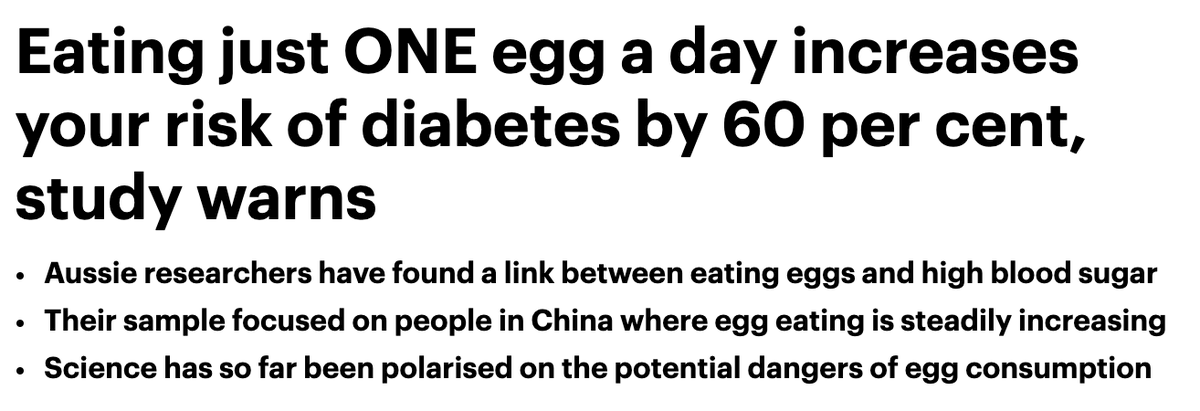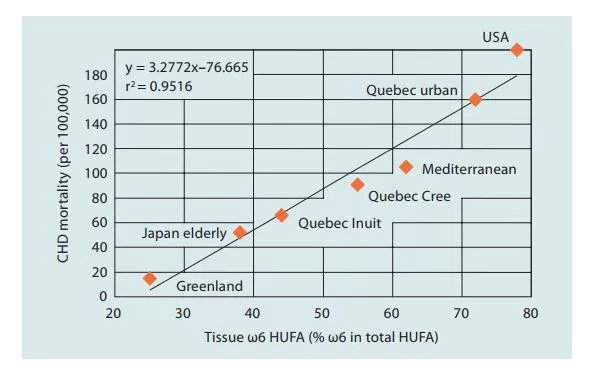
Why you can't rely on media to reliably report scientific findings
And how bad advice about health, fitness and nutrition becomes "common sense"
Thread:
And how bad advice about health, fitness and nutrition becomes "common sense"
Thread:
Journalists have a poor record when it comes to reporting on science
That's especially true when it comes to health, fat loss and fitness
Perhaps the most infamous headline that circulated around Twitter is this ridiculous one from Daily Mail
That's especially true when it comes to health, fat loss and fitness
Perhaps the most infamous headline that circulated around Twitter is this ridiculous one from Daily Mail

The first thing you to understand is that most studies have major flaws to begin with
We know this in part because there's a replication crisis
Replication means the ability to reproduce the same results under the same conditions
You'd think this is pretty rare, right?
We know this in part because there's a replication crisis
Replication means the ability to reproduce the same results under the same conditions
You'd think this is pretty rare, right?
But it's shockingly common
In a 1996 poll with 1,500 respondents, the journal Nature found that 70% of scientists failed to reproduce at least one other scientist's experiment
In a 1996 poll with 1,500 respondents, the journal Nature found that 70% of scientists failed to reproduce at least one other scientist's experiment
And even beyond the fact that many studies cannot be reproduced
So many are poorly designed (maybe accidentally, maybe not)...
And this is how bad advice, over time, becomes common sense
So many are poorly designed (maybe accidentally, maybe not)...
And this is how bad advice, over time, becomes common sense
Nutrition and fitness is what I'm most interested in, because it informs my work with my private health coaching clients
I keep up with the scientific literature every morning, and I use a 4-item checklist to assess the quality every study I review
Here's that checklist:
I keep up with the scientific literature every morning, and I use a 4-item checklist to assess the quality every study I review
Here's that checklist:
1) Is the study using self-reported dietary questionnaires?
If so, it's essentially useless because these assume that people actually remember what they ate, and how much of it they ate over a LONG period (weeks, months or even years)
If so, it's essentially useless because these assume that people actually remember what they ate, and how much of it they ate over a LONG period (weeks, months or even years)
2) Did the researchers account for the healthy user bias?
In a non-randomized trial, healthier than average individuals may make up the majority of a cohort
The healthy user bias arises when healthy people do more or less of a certain activity, but the activity is not causative
In a non-randomized trial, healthier than average individuals may make up the majority of a cohort
The healthy user bias arises when healthy people do more or less of a certain activity, but the activity is not causative
The best example here is with meat consumption
For the last several decades, health authorities have told us to eat less meat, especially red meat..
But we know from both massive studies on the topic and human evolution that eating less meat does NOT make you healthier
For the last several decades, health authorities have told us to eat less meat, especially red meat..
But we know from both massive studies on the topic and human evolution that eating less meat does NOT make you healthier
3) Correlation / Association vs. causation
Few studies show causation, and that's ok, we can learn a lot from correlation and association
But we carefully assess if there is statistical significance, and if so, it must also pass the smell test
Few studies show causation, and that's ok, we can learn a lot from correlation and association
But we carefully assess if there is statistical significance, and if so, it must also pass the smell test
For example, the Daily Mail article about eggs and diabetes
Is it possible that diabetics eat more eggs than non-diabetics?
Of course it is.
But does it mean that eggs contribute to diabetes?
No, it obviously doesn't if you know anything about diabetes and metabolic health
Is it possible that diabetics eat more eggs than non-diabetics?
Of course it is.
But does it mean that eggs contribute to diabetes?
No, it obviously doesn't if you know anything about diabetes and metabolic health
4) Absolute risk vs. relative risk
This is a very common way the media creates headlines
A study may show more relative risk, but without talking about the baseline risk...
That relative risk number alone is basically useless
This is a very common way the media creates headlines
A study may show more relative risk, but without talking about the baseline risk...
That relative risk number alone is basically useless
For example, when a study says a food raises risk, like cancer risk, by 20%
They're talking about relative risk
If the absolute risk is 5%, a 20% increase in relative risk means the absolute risk goes from 5 to 6%
Yet the headlines will say 20%...
They're talking about relative risk
If the absolute risk is 5%, a 20% increase in relative risk means the absolute risk goes from 5 to 6%
Yet the headlines will say 20%...
Oh, and I should point out that I didn't even account for the fact that Big Food and Big Pharma are some of the largest advertisers
In conclusion, if you care about your health, you can't take what the media says about science at face value
In conclusion, if you care about your health, you can't take what the media says about science at face value
If you want to take control of your health from a vetted science perspective (as opposed to misleading headlines...)
I offer 1-on-1 private coaching
You can apply here and I'll get in touch with you within 24 hours, usually faster:
form.jotform.com/B1Client/pd-co…
I offer 1-on-1 private coaching
You can apply here and I'll get in touch with you within 24 hours, usually faster:
form.jotform.com/B1Client/pd-co…
• • •
Missing some Tweet in this thread? You can try to
force a refresh





